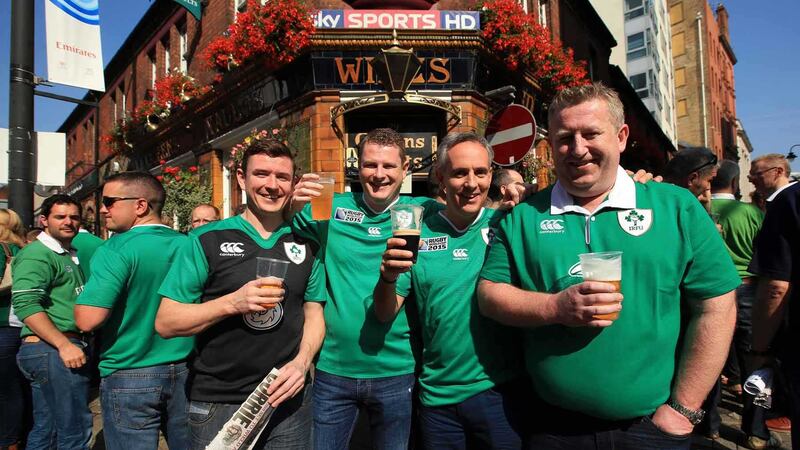Japan’s underdog victory against South Africa last Saturday with a last-touch try was almost unthinkable. And if that moment doesn’t must make you believe today in the power of dedication towards a dream, then nothing will.
Undefeated determination left big monsters of men crying like babies after their first-round World Cup victory. Years of intensive work built up to final seconds of self-belief which turned sporting history on its head.
Here in Ireland, confidence is growing that, eight years from now, we’ll either be hosting – or preparing to host – one of the two rugby world cup finals scheduled during the 2020s.
The Irish Rugby Football Union (IRFU) is readying its bid to host the 2023 finals. If unsuccessful, Ireland will be perfectly placed for the 2027 contest.
The dream of Ireland’s eight million citizens hosting the world’s third largest sporting event with half a million visitors bringing in over €1 billion (and immeasurable additional impacts) is now within reach. But skills and strategy will need to be collectively marshalled across every sector of society, not just sport.
Notable challenges will include addressing some public attitudes, and the creation of mass popular engagement. Perceptions persist about the culture of Irish rugby, alongside concerns about the failure of similar events to deliver social transformation (like South Africa's 2010 FIFA soccer world cup).
Just as the GAA finally elected its first female county chairperson (Tyrone’s Roisin Jordan) only last year, the IRFU will need to review and renew the internal composition and culture of its decision-making. Enhanced social representativeness and community participation could create a positive path dependence which drives the future success of the world cup bid.
By contrast, other baseless or ignorant perspectives will need to be challenged firmly, from outside the rugby family.
For instance – funded by a specific social inclusion programme from sports minister Carál Ní Chuilín (yes, declaration, to whom I was special adviser) – the IRFU's Ulster Branch has increasingly focused on the deprivation needs of places like west Belfast and Ballybeen. That’s why offensive and stupid slurs about Irish rugby being so-called ‘west Brits’ rudely ignore the evidence of factual successes evaluated in Deloitte’s report ‘A Sporting Chance’, earlier this year.
That £4.5 million programme – Promoting Equality, and Tackling Poverty and Social Inclusion – saw the three football codes of rugby, gaelic and soccer working increasingly closely. Themes included equality, inclusion and education; health and well-being; participation of minority sectors, including women, disabled people and homeless people; and employment creation and skills development.
In particular, (nine county) Ulster GAA has partnered consistently with (nine county) Ulster Rugby to create and construct important partnerships across the province.
Ulster Rugby hosting the charity GAA ‘Match for Anto’ at Kingspan Ravenhill stadium was a typical example. Similar co-operation is mirrored nationally, with the GAA facilitating its major stadiums for the IRFU’s bid.
Just imagine what could be achieved by developing this approach under a successful world cup, starting on the weekend of the 2023 All-Ireland football final.
Of course, the serial cynics in the press and the public will always be an underlying irritant. Right on cue when something positive arrives, they’re always there - as predictable as babies peeing in a swimming pool.
Some of the cynics spout resentment at how the IRFU accommodates members from its Ulster Branch whose personal political allegiance is British unionist, rather than Irish nationalist.
The accommodation isn’t pitch-perfect, but it’s a reasonable and genuine effort at sustaining unity through sport. It involves using the IRFU’s anthem ‘Ireland’s Call’ (with Ireland’s national anthem ‘Amhrán na bhFiann’ also sung at home matches), and carrying the nine-county Ulster provincial flag alongside Ireland’s tricolour at the current world cup. It’s significant symbolism of national inclusion (not national inferiority), given that the IRFU never allowed its organisation or its membership to be split by partition or politics.
The irony is most of the cynics have nothing to do with Irish rugby. Plus they seem to ignore the fact that it’s a membership sporting organisation – not a public authority. So if they honestly want its rules to change, there's a simple solution: join it.
The interlinked benefits of political, economic, regional, social and cultural co-operation and unity to be gained from the all-Ireland rugby world cup agenda are potentially unprecedented.
Central to that objective must be tightly structuring the strategic vision and investment around sustainable values of participation, equality, economy and excellence. It can and must be done.
The 2023 rugby world cup could become a generational catalyst for Ireland’s social unity and transformation. Just like Joe Schmidt's men at the current world cup, let's make it happen.
j.kearney@irishnews.com








